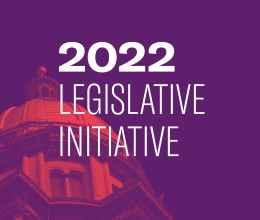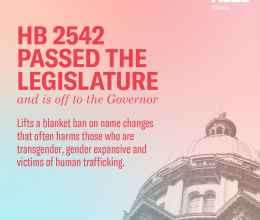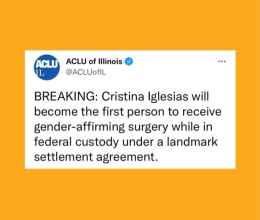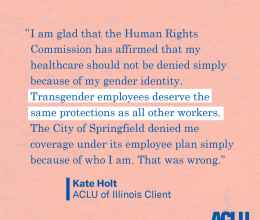Download a PDF version |
The United States Supreme Court’s historic ruling striking down Section 3 of the Defense of Marriage Act (DOMA) is a tremendous victory for loving, married same-sex couples and their families. There are 1,138 places in federal law where protections and responsibilities are based on marital status, but until Illinois allows the freedom to marry, same-sex couples in Illinois will not share in those protections and responsibilities.
What does the DOMA Supreme Court decision mean for same-sex couples in Illinois who have a civil union?
Very little. Unless the same-sex couple is legally married, they will not be eligible for many of the federal programs previously covered by DOMA, over 1000 benefits.
What does the DOMA decision mean for same-sex couples living in Illinois but who were married in another state?
It is unclear. There are still many questions about the extent to which they will receive federal marital-based protections.
We know that these couples will be treated as married by the federal government for purposes of immigration and active duty military benefits. As to the other 1000+ benefits, there is no sure answer. This is because there is no one rule across all federal agencies, and the federal government typically defers to the states in determining whether a couple’s marriage is valid. Some federal programs assess marital status based on the law of the state where a couple resides; Illinois law will prevent legally married couples and surviving spouses from accessing these federal protections and responsibilities.
Here are some examples of the federal benefits and responsibilities that Illinois couples may be denied:
Family and Medical Leave Act – Under the federal FMLA, an employee working for a private employer with 50 or more employees can take 12 weeks unpaid leave each 12 months to care for a spouse with a serious health condition.
Federal taxes – Married persons receive a number of advantages under federal tax law, including the ability to file jointly, take standard deductions, pool income, as well as receive favorable tax treatment for receipt of health insurance, fringe benefits and the sale of a principle residence.
Private Employment – Married persons employed by private employers have a number of protections under federal law, including not having to pay income tax on health care benefits for a spouse, the ability of a spouse and children to access COBRA coverage, and treatment of a spouse as the default recipient of death benefits and pension payments.
Veteran benefits – The spouse of current or retired U.S. military personnel is eligible for a number of benefits including access to favorable home loan programs, burial expenses, educational benefits and health care.
Civilian Federal Employees – Civilian federal employees in Illinois who are in a civil union will not be able to provide health benefits for their partner, provide dental and vision care for their partner, provide long-term care insurance for their partner, add their partner to their flexible expense account or provide retirement or survivor benefits for their partner.
Immigration – A married person under federal law – now including married same-sex couples – can sponsor a spouse for a Green Card and entry into the United States. Already, married same sex couples have been able to block deportation orders since the Court struck down DOMA.
Bankruptcy – Married same-sex couples can file jointly for purposes of bankruptcy.
Medicaid – Under Medicaid, a married couple can protect a healthy spouse’s assets if his or her spouse requires long-term medical care (such as nursing home care).
Medicare – Married couples typically gain access to benefits and protections under Medicare.





